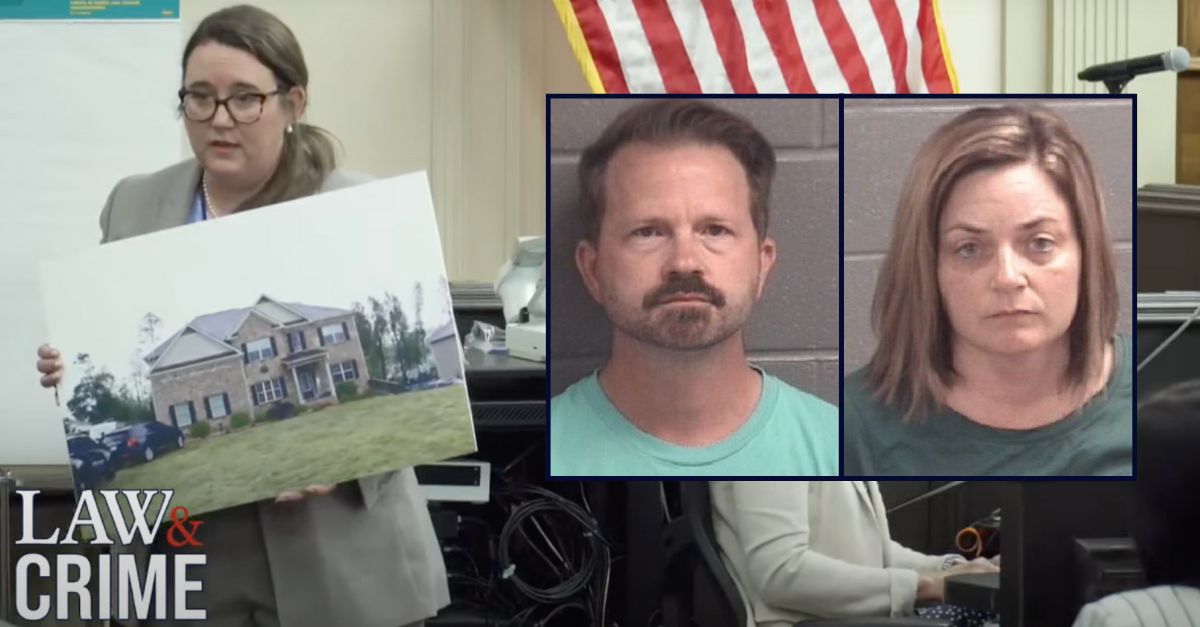
Inset left to right: Tyler Schindley and Krista Schindley (Spalding County Jail). Background: A prosecutor holds up a picture of the Schindley house during opening statements in their attempted murder trial (Law&Crime).
The attempted murder trial of two homeschooling parents accused of starving their 10-year-old son kicked off in earnest with opening statements in Spalding County, Georgia, on Wednesday morning.
But only briefly.
Nearly as quickly as the trial began, proceedings ended as the defendants agreed to plead guilty early Thursday morning.
Krista Schindley, 49, and Tyler Schindley, 48, were accused of myriad charges in the sad and shocking case. The parents of seven children – two by birth, five by adoption – are said to have planned for one particular child to be hidden away while he slowly starved to death so that he could perish without anyone ever knowing he even existed.
“I’d like to apologize to all of our children,” Krista Schindley said during a sentencing hearing on Thursday.
Love true crime? Sign up for our newsletter, The Law&Crime Docket, to get the latest real-life crime stories delivered right to your inbox.
That apology largely fell on deaf ears.
“Never have I seen a case that showed the depths of human depravity like this one,” the prosecutor said on Thursday. “The depth of torture.”
The judge overseeing the case offered a lengthy soliloquy about the “blessing” of having children – a blessing the defendants forfeited.
“I’ve never seen human beings do what you two did to another human being,” the judge said – suggesting the crimes committed by the Schindleys far exceeded those of defendants who came before them.
The judge also explained how he, as an attorney, took an oath to uphold Peach State laws and the Constitution of the United States.
“Under the Eighth Amendment, I’m not allowed to impose a sentence that is cruel and unusual,” the judge intoned. “I’m bound by the Constitution. You better be glad that I am. Because otherwise I would impose a sentence much like the one you imposed.”
Each defendant pleaded guilty to all of the charges against them.
The Schindleys were initially arrested on charges of attempted homicide in the second degree and attempted malice murder as well as various counts of cruelty to children in the first degree, second-degree cruelty to children, third-degree cruelty to children, battery, simple battery, and false imprisonment. Following an indictment, their charges were formalized as one count each of criminal attempt to commit a felony of murder, four counts of cruelty to children in the first degree, two counts of false imprisonment, and one count of aggravated battery, and battery with family violence. Krista Schindley was also indicted on three counts of aggravated assault.
In real terms, both defendants were sentenced to spend 40 years behind bars to be followed by 20 years on probation.
Formally, each Schindley was sentenced to 20 years in prison on the first two counts they faced, and 20 years for the third count, while being sentenced to a variety of time behind bars for each of the remaining counts – but those sentences were assessed to run concurrently, or at the same time.
The state began its presentation by describing a clash between the image and reality of the house where the 10-year-old was allegedly secreted away for at least three years during the starvation regime. In service of this juxtaposition, the prosecution employed a visual aid and metaphor: a picture of the facade of the Schindley residence.
“On the outside it is a picture of the American dream: lovely, everything is where it should be, in pristine condition, perfectly well-cared for, everything inside should be just so,” the prosecutor said. “But if you ever stepped inside 1705 Westminster Circle, things are not as they appear.”
The prosecutor extended her metaphor of a darkness-tinged American family by describing the tail end of a hypothetical process of purchasing a “beautiful” and “wonderful” and seemingly “perfect” home – only to have hopes dashed during the final inspection.
“As the inspector goes in, he find that the joints are crumbling, that the foundation is cracked, that black mold has spread throughout the house and infecting everything and it’s not safe to breathe inside,” she went on. “The house is toxic. Everything shifts. No longer is that house safe for you or your family.”
That toxicity, the state argued on Wednesday, emanated from one very different bedroom – the bedroom where the boy lived.
“Though the picture on the outside was perfect, the interior of this house was built on a foundation of crumbling control,” the prosecutor continued. “The black mold of shame and humiliation were what held the roof in place.”
In May 2023, the Schindleys’ 10-year-old child was found emaciated, wandering along the street in search of food which he planned to obtain at a local Kroger grocery store, and begging never to return to their grasp or residence, authorities in the Peach State allege.
When the boy was found by neighbors, who called police, he weighed 36 or 37 pounds. A typical, healthy weight for a 10-year-old in the United States would be markedly higher, according to the CDC.
Prosecutors claim the couple caused their son “cruel and excessive physical and mental pain” when they “intentionally withheld food from [him] for an extended period of time,” according to warrants in the case obtained by Atlanta-based NBC affiliate WXIA. The couple also allegedly caused their son “dental injury and disfiguration,” withheld medical attention, and locked the boy inside his bedroom “for extended periods and on multiple occasions, with no access to lights, food, clothing or adult interaction and/or assistance.”
The boy’s stepbrother, Ethan Washburn, 21, was later arrested in the case – accused of choking the child’s neck with both hands.
Jury selection in the case began on Monday. Jurors were brought in on Wednesday – after the state received permission to use the visual aid.
During her presentation, the lead prosecutor promised the jury the state would be forthright about food and hunger issues the 10-year-old had long suffered – even before he was formally adopted by the Schindleys.
Those issues – being “constantly upset,” “constantly hungry,” “constantly trying to get food,” and “constant asking for food” – were known to the child’s teachers and parents, the prosecutor said.
Eventually, the boy was pulled out of school; then the COVID-19 pandemic hit and the child “completely falls off the radar.”
In October 2020, the Schindleys moved to the house on Westminster Circle, the prosecutor explained – again picking up the poster board image of the family’s final residence to show the jury.
“You’re going hear all about what that singular room in 1705 Westminster Circle held,” the prosecutor said. “You’re going to hear how the defendants violated law after law – both moral law as well as the rules that are set forth by the State of Georgia. And they did it intentionally.”
The Schindleys, the prosecutor alleged, never wanted the boy. The starved child was, rather, the “sacrificial lamb” and “the cost” of adopting his twin siblings, according to the prosecution.
“You’re going to hear about the cruel and malicious things that were done to him,” the prosecutor said. “Because they didn’t want him.”
In addition to food, the boy was allegedly denied proper clothing, electricity, and toilet paper, prosecutors allege.
During the defense’s opening, an attorney for Krista Schindley said she was “not a monster” and that the woman never intended to adopt or foster any children and then commit the crimes alleged.
“All Krista ever wanted was a big family,” the defense attorney said. “One that included lots of children. Even if it meant that they had to adopt and foster.”







